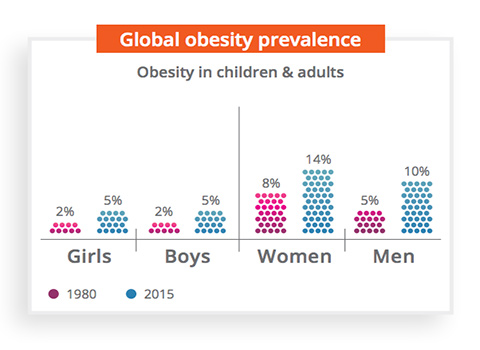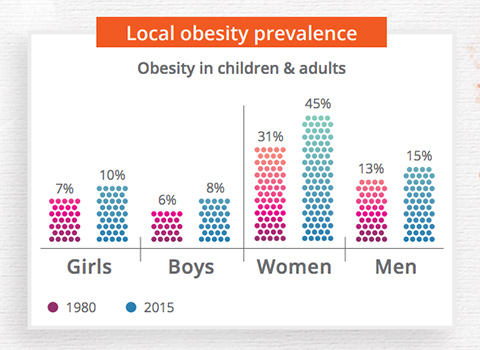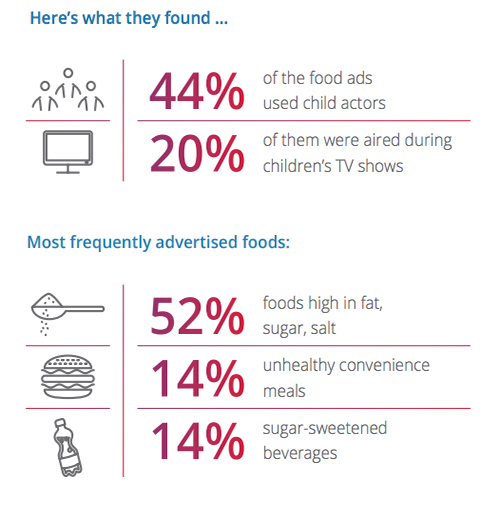How food marketers target your kids (and how to counter it)

In many countries, the problem of obesity among children and adolescents seems to be getting bigger, faster - and it's up to discerning parents and other adults to take a stand.
The rate of childhood obesity is increasing, with prevalence up in both boys and girls, from developed and developing countries alike. This is according to the 2017 Vitality ObeCity Index:


The link between marketing and obesity
Children and young adults are a key target demographic for food marketers. This isn't because they purchase food themselves (although many of them can), but because they influence the purchasing decisions of their parents - and because today's youth are the tomorrow's adults.
Data from a number of studies clearly show that food marketing to children is effective in that it increases both preference for and consumption of the advertised foods. So it stands to reason that restrictions on marketing food to children can well help to slow increasing childhood obesity.
Our food ads are influencing kids
A 2017 study published by Wicks et al. in the British Journal of Nutrition has taken a closer look at the advertising of food and soft drinks to South African children, and also how our local nutrient profiling model for restricting this advertising measures up.

Tips to try counter the influence of food marketing
"You can't tell people how to eat healthily if they're in an environment that doesn't support health preference learning. Education is one thing, but if you're constantly being bombarded with unhealthy messaging, it's really difficult," says Dr Mariaan Wicks, Lecturer, North-West University's Centre of Excellence for Nutrition.
The fact is - food marketing is pervasive and sometimes unavoidable. However, here are some ways you can try and limit its influence on your children:
- Don't give in to demands to buy sugary cereals or fast food simply for the sake of collecting a toy - you are doing your children more harm in the long run.
- Limit TV-watching, which can expose your kids to a lot of fast-food advertising, as well as create a habit of passive sedentary leisure time (as opposed to encouraging them in more active or creative pursuits).
- You could also watch kids' shows with them on catch-up rather than on live TV, so you can skip ads.
- Try not to reward them with the promise of junk food, which may cause them to repeatedly associate unhealthy foods with pleasure and comfort later in life. Instead, treat them to fresh, healthier options or to your undivided time and attention.
- Support legislation that endorses good nutrition; limits the power of manufacturers and distributors of unhealthy foods and drinks; and that restricts food marketing to children.
Jacques Rousseau, lecturer in critical thinking and ethics at the UCT School of Management Studies, reminds parents that they have a vital role to play in early childhood development, where food choices are being formed:
"We can't control everything our children do, but we can control some of it. In addition to encouraging healthy eating habits and physical activity, leading by example, we can attempt to limit time spent watching TV, playing computer games and surfing the Internet. We can encourage school governing bodies to take healthy-eating choices seriously, and hold them to account for not doing so."
"And," Rousseau adds, "we can remind ourselves that most of the time, it's not the increasingly-overweight children that are buying food. It's us." So pass a love for and dedication to healthy habits onto your kids, and praise and encourage them when they embrace healthy living - good health all starts at home!
Teach your kids to love and make good food
Want to instil healthy habits in your kids? Practical, lifelong skills in how to cook could be one of the best gifts you ever give them.
Visit the Discovery Vitality HealthyFood Studio for fun, interactive cooking courses aimed at kids. The Sandton-based studio is open to the public, so book a spot today!
Related articles
5 reasons we buy what we do (and get fatter for it)
An obesogenic environment is one which is not conducive to weight loss, but rather one that promotes weight gain. The bad news is: we live in one. The good news is: we can fight it!
Do you live in SA's healthiest city?
If you reside in Port Elizabeth, alas the answer this year is no! Here's the lowdown on the 2017 Discovery Vitality ObeCity Index, which presents the latest insights on weight status and food purchasing behaviour across the country.
A peek into South African pantries
Coffee, cow's milk, fatty foods, wine – good or bad for you? Over the years, nutrition recommendations about what's healthy and what's not have swung from one extreme to another, leaving us hungry and confused!